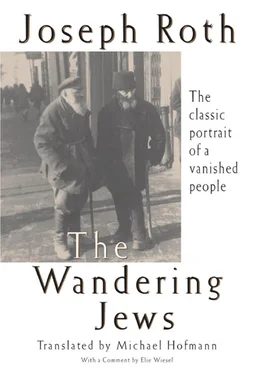But I have seen it. I have seen that four thousand years of being a Jew, nothing but a Jew, have not been without effect. It’s an old destiny, an old, richly experienced blood. Jews are of an intellectual cast. They are a people that has had no illiterates for nearly two thousand years now; a people with more periodicals than newspapers; a people whose periodicals, probably uniquely in the world, have a far higher readership than its newspapers. While the other peasants around him are finally struggling to read and write, the Jew, behind his plow has his mind on the problems of relativity theory. No machinery has been invented for peasants with such an advanced brain. Primitive gear demands a primitive mind. Even a tractor is a simple tool, compared to the dialectical intelligence of the Jew. The new Jewish colonies may be well kept, clean, and profitable. (To date there are also very few of them.) But they remain “colonies,” they have not become villages.
I can see the obvious objection: The awl, the plane, the hammer of the Jewish artisan are certainly no more sophisticated than the plow. But the work is also more directly creative. In the making of a loaf of bread, most of the work is done by nature. In the making of a boot, it is done by man.
I can see a second objection, too: that so many Jews work in factories. But in the first place, most of them are trained specialists; second, they manage to divert their hungry minds from purely mechanical labor by intellectual hobbies, by artistic dilettantism, by political activism, avid reading, or writing for newspapers; and third, one may observe, if not a stream, then at least a steady trickle of Jews leaving the factories, especially in Russia. They leave to become self-employed craftsmen if not entrepreneurs.
Can, say, a little Jewish “matchmaker” ever be turned into a peasant? His occupation is not only unproductive, it is, by some lights, even immoral. He has lived badly, not earned very much, existed more by scrounging than by working. But what intricate, difficult, albeit reprehensible work his brain has had to do to find a “match,” and to extort a substantial tip from a rich, miserly fellow citizen! What will his brain do in the ghastly quiet of his new existence?
The “productivity” of the Jews has never been crassly visible in any case. If twenty generations of unproductive introspectives have lived to produce one Spinoza; if it took ten generations of rabbis and traders to spawn a single Mendelssohn; if thirty generations of mendicant wedding musicians have been fiddling away so that one famous virtuoso is born; then I for one am not against such “unproductiveness.” Maybe we wouldn’t have had Marx and Lassalle either, if their forefathers had been turned into peasants.
If synagogues are now being transformed into workmen’s clubs in Soviet Russia, and Talmud schools are banned on the grounds that they are religious establishments, then we need to be very sure about the distinctions between knowledge, religion, and nationality with Eastern Jews. But it seems clear to me that knowledge is religion, and religion is — nationality. Their clergy are their men of learning, and their prayer is an expression of nationhood. But the entity that is now set to enjoy the rights and freedoms of a “national minority” in the Soviet Union is a different sort of Jewish nation. They are a people with old heads and new hands, with old blood and a relatively new written language, with old gifts and a new national culture. Zionism wanted to combine tradition with progressive thinking. The Jewish minority in Russia does not look back at all: They don’t want to be the heirs of the old Hebrews, merely their descendants.
Inevitably the sudden freedom of Russian Jews provokes a vehement, if stifled, anti-Semitism here and there. When an unemployed Russian sees a Jew taken on by a factory in order to become “industrialized,” when an expropriated kulak gets to hear of more Jewish colonization, then an ugly, old, artificially nurtured instinct is bound to rear its head again. But while anti-Semitism has become a subject for study in the West, and blood lust a political point of view, in the new Russia, it remains a disgrace. What will ultimately kill it off is public shame.
Once the Jewish question is solved in Russia, then it is on the way to being solved everywhere. (There is hardly any Jewish emigration from Russia anymore, if anything net im migration.) The piety of the population is declining rapidly. The stronger barriers of religion are falling, replaced by the weaker ones of nationality. If this process continues, the age of Zionism will have passed, along with the age of anti-Semitism — and perhaps even that of Judaism itself. It is a development that will be welcomed in some places and regretted in others. But everyone should take notice as one people is freed from the stain of suffering and another from the stain of cruelty. The victim is freed from his torments and the bully from his compulsion. This is a great accomplishment of the Russian Revolution.
*Vyacheslav Plehve (1846–1904), czarist minister of the interior.
†A dessiatine is a Russian unit of land measure equal to 2.7 acres.
‡Now Belarus.

It is my duty to alert the esteemed reader to the fact that the position of the Jews in the Soviet Union, as I tried to describe it in the last section of my book, has in all likelihood changed since that time. No figures or statistics are available to me. Those I cited previously I collected myself on a fact-finding visit to Russia. I cannot give the same credence to the tendentious and unreliable figures I might be able to get from Moscow now. I remain convinced, however, that nothing in the underlying attitude of Soviet Russia toward the Jews has altered. It is this underlying truth that matters, not the figures.
At this point I should like to refer to the grimmest development in recent years: I mean of course the Spanish Civil War. A minority of readers will be aware of the version of the story according to which the cherem , the rabbinical curse that was laid on Spain following its eviction of the Jews, is presently about to lapse. I am of course not claiming any explicit connection between the metaphysical curse and the grim reality. But I trust I may be permitted to draw the reader’s attention to the facts.
I don’t want to be misunderstood as saying: Just as the curse is wearing off, Spain is experiencing the greatest catastrophe in its history. I want only to point out the— certainly more than curious — coincidence of timing; and to quote the sentence of the fathers that goes: “The Court of the Lord is in continuous session, here on earth and in the hereafter.”
Centuries may pass — but the judgment is ineluctable.
— JOSEPH ROTH
June 1937
P REFACE TO THE N EW E DITION (1937)

1.
Many years ago, when I wrote this book, which I now hope to set before the reader in revised form, there was no acute problem affecting the Jews of Western Europe. What mattered then was to persuade the Jews and non-Jews of Western Europe to grasp the tragedy of the Eastern Jews — and especially in the land of unlimited opportunity, by which of course I mean not America but Germany. There was of course a degree of latent anti-Semitism there (like everywhere else). Most German Jews regarded themselves, despite an abundance of clearly threatening evidence of anti-Semitism, as perfectly good Germans; on High Holy Days, at most, they thought of themselves as Jewish Germans. They took great pains either to take no account of latent anti-Semitism or to overlook it altogether. In the case of many or even most Western Jews, they attempted to replace the lost or diluted faith of their fathers with a willful blindness, which I describe as a superstitious belief in progress. Some of them unfortunately gave in to the temptation to blame Jewish immigrants from the East for the expression of anti-Semitic feeling. It is an oft-ignored fact that Jews, too, are capable of anti-Semitism. One does not want to be reminded by some recent arrival from Lodz of one’s own grandfather from Posen* or Katowice. This is the unworthy but understandable attitude of an insecure middle class just scaling the steep ladder into the echelons of the upper middle class, with fresh air and scenic views. At the sight of a cousin from Lodz, one may easily lose one’s balance and fall.
Читать дальше














